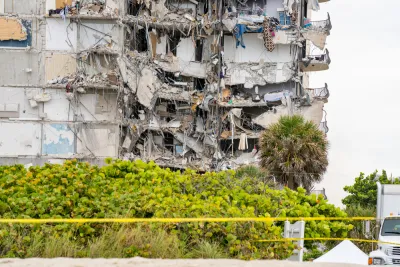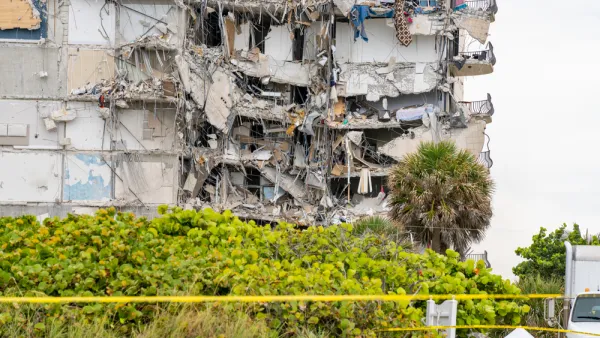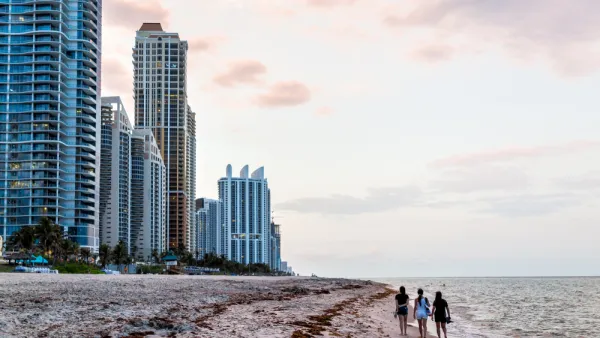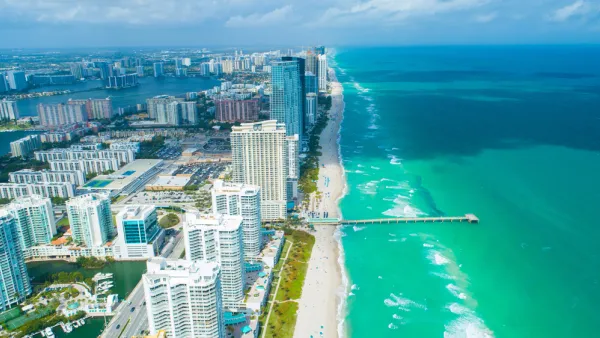Last year's Miami Beach condo collapse could portend more tragedy to come if developers don't address the risks of aging buildings and climate change.

In a deeply reported piece in The New York Times, Matthew Shaer examines the risks faced by Miami Beach's many high-rise condo buildings, a risk made painfully clear by the June 2021 collapse of a Surfside high-rise. With 98 fatalities, the collapse was "one of the deadliest engineering failures in the history of the United States."
According to James McGuinness, chief building official for Surfside, "This terrible tragedy, which is a national tragedy, is going to change the building codes as they relate to certification and all existing buildings." McGuinness warned that the soil that buildings are built on is an important factor, particularly in coastal zones where existing land is often shored up with infill.
But meaningful reform, of the kind McGuinness imagined, has long been notoriously hard to enact. Florida has roughly 1.5 million residential condo units — among the most of any state — and a highly lucrative condo and co-op industry with many powerful players, from management companies and developers to firms specializing in condo law. Historically, these groups, and the lobbyists who represent them, have successfully pushed back against any policy they view as constrictive or unduly expensive.
Built at the turn of the 20th century on a foundation of former mangrove swamps, Miami Beach is home to hundreds of aging buildings that face similar risks to Champlain Towers. Experts say the state must urgently strengthen regulations that hold developers accountable for the safety of their projects, regulations described in more detail in the source article. Many residents, Shaer writes, find themselves in a bind. "Median house prices are soaring; the real estate market is sloshing with investor cash. But the dangers of staying put are potentially even greater."
FULL STORY: The Towers and the Ticking Clock

Analysis: Cybertruck Fatality Rate Far Exceeds That of Ford Pinto
The Tesla Cybertruck was recalled seven times last year.

National Parks Layoffs Will Cause Communities to Lose Billions
Thousands of essential park workers were laid off this week, just before the busy spring break season.

Retro-silient?: America’s First “Eco-burb,” The Woodlands Turns 50
A master-planned community north of Houston offers lessons on green infrastructure and resilient design, but falls short of its founder’s lofty affordability and walkability goals.

Test News Post 1
This is a summary

Analysis: Cybertruck Fatality Rate Far Exceeds That of Ford Pinto
The Tesla Cybertruck was recalled seven times last year.

Test News Headline 46
Test for the image on the front page.
Urban Design for Planners 1: Software Tools
This six-course series explores essential urban design concepts using open source software and equips planners with the tools they need to participate fully in the urban design process.
Planning for Universal Design
Learn the tools for implementing Universal Design in planning regulations.
EMC Planning Group, Inc.
Planetizen
Planetizen
Mpact (formerly Rail~Volution)
Great Falls Development Authority, Inc.
HUDs Office of Policy Development and Research
NYU Wagner Graduate School of Public Service




























